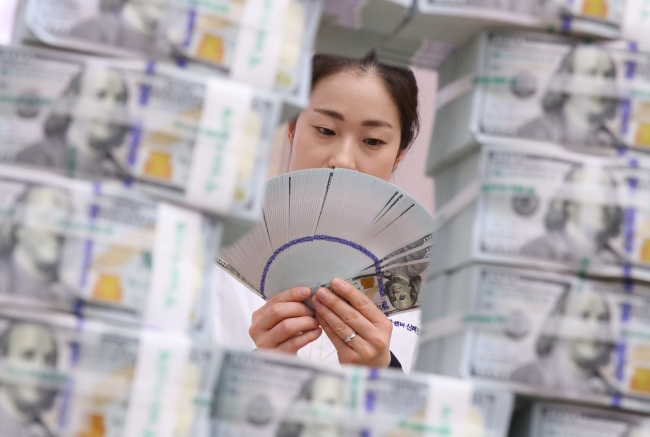An increase in government spending, which has been precipitated under President Moon Jae-in’s administration, contrasts with sluggish private consumption in the country.
Economists note that expanded public expenditure coupled with dampened private consumption will do little to reinvigorate the Korean economy that is losing growth momentum.
Recent data from the Bank of Korea showed government outlays accounted for 23.63 percent of the country’s domestic final consumption expenditure in the first half of this year, up from 23.54 percent last year. The proportion of private consumption decreased from 76.46 percent to 76.27 percent over the cited period.
Korea has seen the weight of government spending relative to personal consumption continue to grow over the past years. Government spending is set to increase at a faster pace under the Moon administration, which has been expanding welfare and employment programs.
It drew up a supplementary budget of 11 trillion won ($9.73 billion) shortly after Moon took office in May 2017 and another worth 3.8 trillion won this year to increase welfare benefits and job opportunities.
The 2018 national budget set at 428.8 trillion won marked a 7.1 percent rise from 2017.
 |
(Yonhap) |
In a meeting with reporters last week, Economy and Finance Minister Kim Dong-yeon suggested that the budget would expand more than 8 percent next year. The ruling Democratic Party of Korea has called for a 10 percent hike in fiscal spending next year. This means the 2019 budget could exceed 470 trillion won.
What emboldens the Moon administration to expand fiscal spending is a continuous rise in tax revenue.
According to figures released by the National Tax Service last month, the country’s tax revenue amounted to 255.6 trillion won in 2017, up 9.5 percent from the previous year. Taxes collected from companies increased 13.5 percent on-year to 59.2 trillion won, accounting for nearly a quarter of the total revenue.
A fiscal report published earlier this month by the Ministry of Economy and Finance showed Korea’s tax revenue amounted to 157.2 trillion won in the first half of this year, up 19.3 trillion won from a year earlier. The revenue is expected to reach 290 trillion won by the end of the year.
In contrast to expanded fiscal expenditure, private consumption has remained sluggish. According to BOK data, the on-quarter increase in private consumption slid from 1 percent in the final three months of last year to 0.7 percent in the first quarter of this year and 0.3 percent in the following three months. The consumer sentiment index in July dropped by 4.5 percentage points on-month to a 15-month low.
Slumping consumption shows the income-led growth policy pursued by the Moon administration has failed to bring its intended outcomes. Steep minimum wage hikes and other measures taken to push for the policy has only resulted in a cut in jobs and earnings particularly for low-income people, dampening their consumption expenditure.
The Moon government is under growing criticism for squandering taxpayer money to gloss over the fallout from its policy failure.
Concerns have been raised about the widening gap between government outlays and private consumption as a rise in government spending is less efficient in bolstering economic growth.
“Fiscal spending increase is noticeable, but the prevailing sentiment is that it will make little contribution to growth,” said Choi Kwang-hyuk, an economist at eBest Investment and Securities.
Data from local research institutes show government consumption expenditure has made a near-zero percentage point contribution to growth on a quarterly basis since 2011.
Sluggish private consumption comes with a decline in investment, deepening concerns over the possibility of the economy being dragged into recession. Official data showed facility investment shrank 6.6 percent on-quarter in the April-June period, the steepest decrease since the first quarter of 2016.
The Korea Development Institute, a state-run think tank, noted in a recent report that weak domestic demand was slowing the pace of economic recovery.
Economists call on the Moon administration to depart from its income-pulled growth policy aimed at boosting consumption not by letting companies take the lead in job creation but by expanding fiscal expenditure to fund employment programs.
“Economic indicators will worsen down the road if the current policy stays on course,” said Kang Myung-hun, an economics professor at Dankook University.
A continuous rise in tax revenue is also far from guaranteed as the weakening competitiveness of the country’s key industries amid deteriorating external conditions is set to reduce corporate profits and levies collected from local firms.
According to FnGuide, a financial information provider, the second-quarter operating profits of more than half of 155 local listed companies surveyed fell below market expectations.
Economists say the revenue increase stems mainly from the strengthened scheme of tax collection and should not be regarded as reflecting an improving economy.
Government officials say there will be little problem with tax revenue owning to a boom in the semiconductor sector by next year, but acknowledge no credible forecast could be made beyond then.
An analyst at a state-run research institution, who requested anonymity, expressed worry that the country’s fiscal deficit would begin surging rapidly from 2020.
By Kim Kyung-ho (
khkim@heraldcorp.com)








